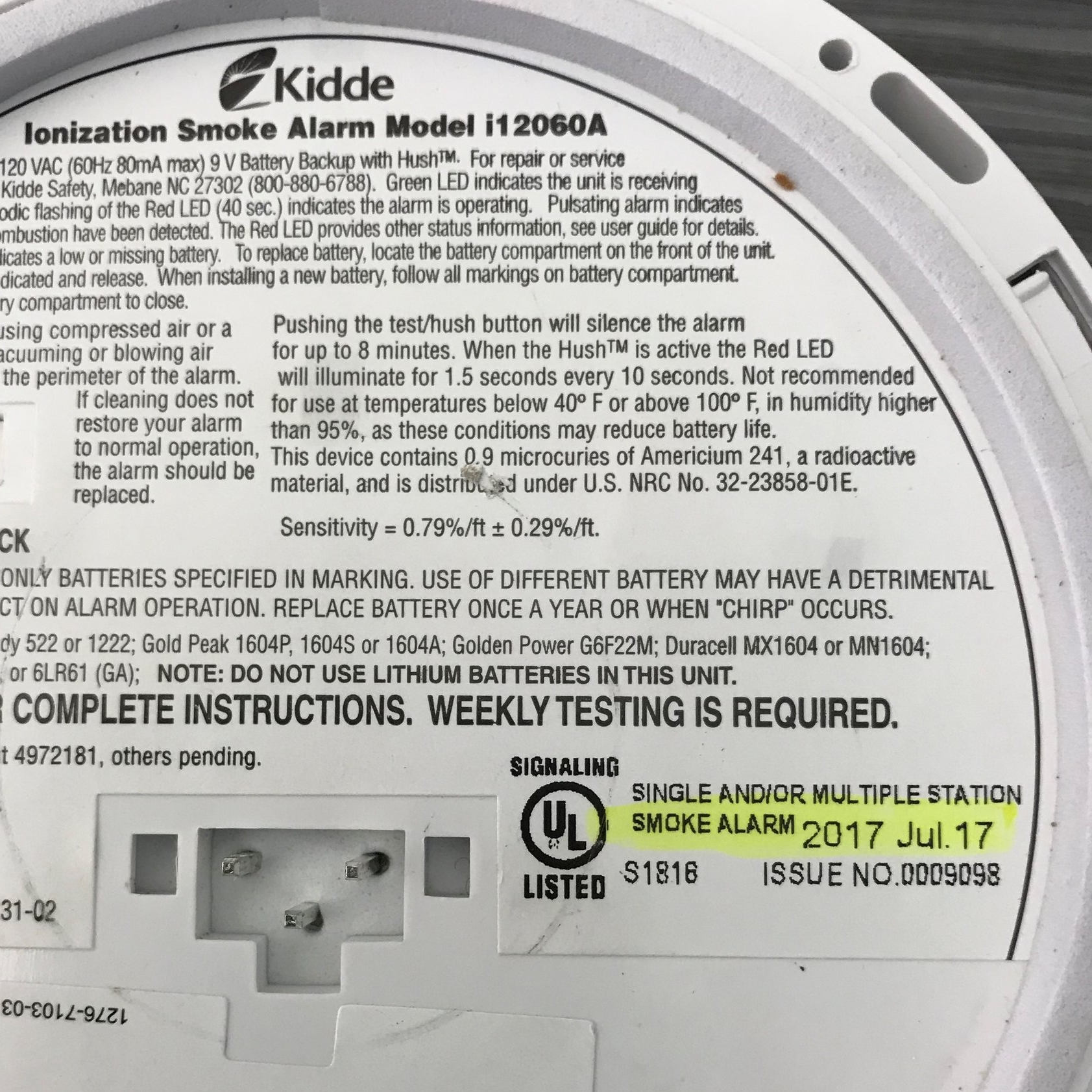PUBLIC SERVICE ANNOUNCEMENT
You Probably Need To Replace YOUR Fire and Carbon Monoxide Detectors
Fire and Carbon Monoxide Detector Facts to concern yourself with:
1. Smoke and Carbon Monoxide units do not last forever.
a. If you have ones that were installed prior to 2013, they were only warranted for 5 years. It is time to replace them.
b. If you have ones that were made after 2013 by Kidde they are now warranted for 10 years and need to be replaced every 10 years.
Check the date on the back of your detectors.
2. You need to Clean your Smoke and Carbon Monoxide Detectors 1-2 times a year.
a. Once a year for ionization alarm (model numbers by Kidde start with an i) and
b. Twice a year if you have a photoelectric censor (you guessed it model number starts with a p) be certain to spray the black photo cell that is visible well that is the detector.
c. Use compressed air and spray into the little vents.
Red arrows indicate where you need to blow out with compressed air.
3. Batteries …the more you know:
a. If you have a “10 year battery unit,” it will not have a battery door and the unit will need replaced every 10 years.
b. If it is hardwired, you will have back up battery.
i. The backup battery needs changed every year just like the old battery only ones. Some people still like to do it in the spring and fall with the time changes and it is better safe than sorry.
Hard wired detectors have a back up battery that needs replaced once a year. Ten year lithium battery units don't have access to battery. Battery powered are better than nothing but only if they are less than ten years old and you have to keep them installed and change battery yearly.
How have I become so versed in this you ask?….if you have time the story is below… more important....check your systems and know what the maintenance requirements and life time of your units are.
*My information is based on Kidde brand and if you need more information call Consumer Hotline 1-800-880-6788 or go to www.kidde.com or check your units and call the appropriate manufacturer. Model number and date of Manufacture is on the back of your unit. March 2018 there was a recall on some Kidde detectors. Learn more by reviewing your system and reading up on it.
Post Construction Drama:
Drama Act I
Scene: A few weeks after closing construction permits, with only a few punch list items to go. It’s a Friday evening, end of a long week, family and dog ready to toss a meal together in our shiny new kitchen and crash on the new big comfy couch and chill when the Carbon Monoxide Detector sounds. Family grabs the dog and leash, coats, and phone and run out of house. They call 911 and the fire department, PSE&G as well as EMS show up. Husband who is still at the office is summons.
The Fire Department arrives and determines, we definitely had Carbon Monoxide and the Fire Department and PSE&G are working to locate the culprit.
Fire Department detects Carbon Monoxide
The experience and drama have taught me many things and I continue to learn…
1. Maplewood still has a very thoughtful and kind Fire Department.
2. My neighbors are really every bit as kind, cool and fun as I thought.
a. They gave us their leftover dinner from a local restaurant and a drink while we waited for the house to air out.
3. PSE&G is very responsive when it comes to emergencies during and the day after.
Our Carbon Monoxide detectors went off and within 15 minutes the new forced air system took the Carbon Monoxide all the way up into the bedroom floors registering way over 200 ppm in the basement and over 80ppm in the attic so having Carbon Monoxide detectors on every floor is important.
The cause: The chimney was extended during our renovation. I noticed construction debris in our fireplace and cleaned it up and noted that we should get the flue cleaned before we light a fire again. Working to maintain a cash flow in the household, I felt like that could wait until the fall. ..I was thinking chimney flue maintenance is not nearly as fun as buying new bar stools or area rugs.
Scene 1 Act II
Glad to finally get back into the house over 2 hours later, and the power on the entire block goes out….we did not invest in a generator as part of our renovation. It only lasted a few minutes and all was well. Unrelated all is good for the evening.
Scene 1 Act III and IV
Saturday afternoon, the PSE&G service man came back on it was discovered that the other flue that services the boiler and hot water heater was full of bricks and mortar and coated in a thick layer of carbon. He pulled a bucket of debris out of the flue. I completely forgot that there are two flues and the same type of debris probably went down the boiler/hot water flue as well when I put off that maintenance.
A follow up date with the Chimney Flue experts reveals that we need to have the hot water heater connection pitch corrected (new code on that) and the water heater and boiler flue lining needs replaced as there are cracks and holes in the flue and that the thick layer of carbon within the hot water flue connection and the boiler flue and they should be “clean enough to lick”.
Putting my new décor on hold as we address these repairs and feeling thankful that when the alarm sounded that we responded immediately and not like in the past …where we stand around and questioned if anyone changed the battery lately. And because we had disable some and got lazy about putting them back up after the smoke detectors were set off yet again by the steam from the shower on the second floor and a pot of boiling water in the kitchen that we began to ignore them. DO NOT DO THAT.
If you are renovating more than a certain percentage of your home you are required to add “hardwired” systems to your home. I now recommend that you do it anyway. It is an expense that will protect your family as well as the investment in your home. The new systems are more sophisticated and don't go off on whims.
Drama Continues
Scene 2 ACT I-
Scene: Family and dog sound asleep 4:30 am a week later on a Saturday morning, FIRE! Fire Alarm Sounds and the word FIRE is announced on the daisy chained system blares for a hot second and stops.
We are catapulted out of bed. The dog is barking. No more alarm, no announcements, nothing. We survey the house and question what we should do….
I decide to call my new friends at the Maplewood Fire Department directly instead of 911. We talk and they determine the best course of action is for them to come up the hill and have a look. I pleaded “just don’t sound the sirens on your way up the hill”… the neighbors are cool but really who wants to wake up with their kids up at 4:30 am on a Saturday for something that appears to be a faulty alarm system. So flashing lights but no siren.
What we learned. The basement detector has issues and needs replaced. So I did that. And because I read directions I learned a thing or two and then had lots of questions that prompted a call to Kidde the manufacturer of the system we have. Customer service was very helpful and knowing I am probably not that different than most homeowners, I spent some time educating myself a little more and thus the PSA above.
Conclusion ...been extremely lucky. These incidents have been a shot across the bow and I intend to be on top of this going forward home manitence is not sexy but very necessary.
Post Script…
I received a call from a colleague/contractor that heard about the drama and he recommended that based on his experience one should also add snaking and flushing your sewer lines as unintended construction waste also ends up in the sewer pipes especially if your remove a toilet or add one. So, if you have recently renovated or you intend to in the future….add these items to your list of post construction tasks and expenses.




